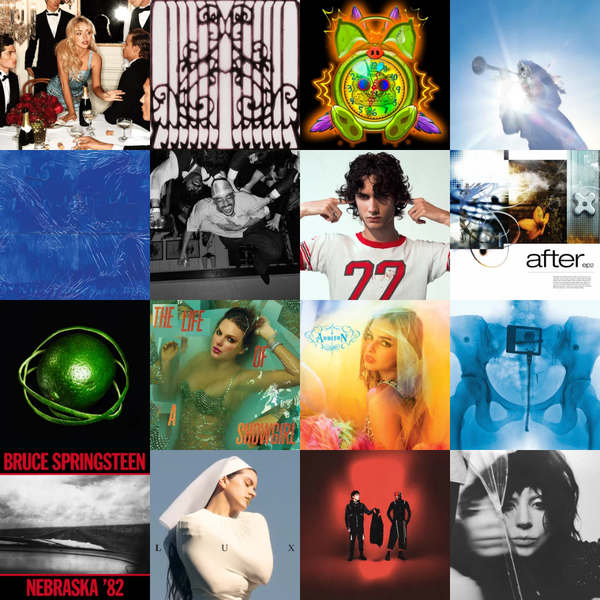Beyond the Page #2: Breaking Down Billboard With Mark Grondin of Spectrum Pulse

Being a music critic is weird. You miss a lot, and it’s easy to turn up your nose at genres of music that quickly take over the world. And even when you find success, you remember that the written word is increasingly outdated; maybe I’d get more readers if I put Subway Surfers videos as a sidebar.
Fortunately, there are still ambitious critics, and holding down the fort is Mark Grondin of Spectrum Pulse. For over a decade, Grondin has sat at a couch with a plush Voltorb and delivered commentary on music. Like me, he’s autistic, and a lot of his quirks (catchphrases like “by the nine hells”) and running bits (rappers stealing YOUR girl) wound up endearing me to his videos. While his most famous videos are where he tears into acts like AJR, there’s a lot of insight to be found, especially in his Billboard Breakdown series. In some ways, that’s what it says on the tin, but he goes in depth on practically every song to chart from the last few years.
That leads him to some great work in the video essay area: in Grondin’s Bro Country video essay, he walks through the recent history of Music Row, discussing how if a scene goes unchecked, it leans into its worst impulses. Until Jason Aldean hits #1 with the disturbingly reactionary “Try That in a Small Town.”
I disagree with Mark some of the time – usually because I think a song sounds great and he doesn’t, or vice versa – but find somebody else covering Billboard with this amount of dedication! Few others are doing what Mark Grondin does, and few others have his taste in both independent and mainstream music, which is so refreshing. (I should disclose he reviewed a record I put out under my former stage name back in 2021, and also put “Dress” on his top songs for that year. That's not why I like him!)
Below we talk about Grondin’s origins, his process, and what’s next.
Information about his upcoming essay will be on the paid tier for now, and will be added to this review once the video is out.
What got you to start a YouTube channel and start reviewing music?
Well, a couple of factors. First off, I had always been writing in some variety. I wrote fiction in my teenage years and into university.
I started writing and doing reviews actually first on Facebook back in like 2009, 2010. I wanted to have a platform just to talk about some specific things and not just vent to my friends. After I graduated and got my degree, I basically went back to my parents who had moved to a different city.
So I lived with them for the summer and I rapidly discovered that I had no friends in that area. And I was extremely bored all summer as I was searching for a job. So I basically spent a lot of time taking very long walks in nearby woods, listening to a lot of music and then coming back.
I thought I might as well start blogging about this. From there, I did that from across 2012 to about mid 2013. The funny thing with that is it was like an original Blogspot, it wasn't very well optimized at all, but I wasn't getting traffic and I wasn't seeing this. I thought hey, this YouTube thing could be something viable. And I did my first 40 reviews on YouTube with no camera.
So it was just a webcam and teleprompter. And I got the best mic I could afford because I was always told that the most important thing is actually having competent audio. They'll excuse bad video for a long time, but competent audio, they won't. Got a camera in like September, October of 2013. And it's been smooth sailing from there.
Where does the name come from?
It is a triple entendre. Part of it is based on my physics. Part of it's based on me. And part of it is somewhat metaphorical.
What got you to start Billboard Breakdown?
A lot of critics at the time had gotten into Hot 100, through acts like Todd in the Shadows and other people who were starting to talk about it. I was kind of in my own little silo for a while, especially as I talked about country music and nobody else did. The other thing was building something that would consistently bring people back. I wanted something that they weren't just there for the one review that they would have a reason to have some like a larger serialized audience.
I did have a background in statistics - my major is physics. I minored in economics. The overlap between them is statistics, so a lot of the math side of it came out relatively cleanly. And that's where I then did a little bit of deep diving. I found Pulse Music Board, where I actually found people who were as obsessive about the charts for differing reasons.
The way I styled the show was pairing my usual music review format with the sports element of it. Like ESPN and stuff like that, but also with the acknowledgement that music can't and should not be as like analytical numbers driven. So a big part of Billboard Breakdown is taking the piss out of Billboard as well. There are some good people working over there, but holy God, there is so much incompetence.
I’ve been on the editorial side for them before and that’s fine, but I don’t know what’s going on with the people who actually organize the charts.
And that's part of the problem. I get the feeling they're trying to do this as well as they can. I don't ascribe malice to Billboard, and that's something I want to establish. As much as I rip into them consistently and there is a pattern of behavior that goes back decades, it is a fallible institution. You're dealing with people who are trying to amalgamate sales data, streaming data, and radio airplay spins, and try to synthesize a formula that makes them all make sense. Whereas if you were just counting the sales of a song, that's easy. But trying to get that and have some level of equivalence with how radio shifts and how SoundScan numbers will fluctuate based upon the number of radio stations.
And what is the stream even worth? Trying to get that, trying to synthesize a formula and then also realizing that Billboard is going to get yelled at by pretty much everybody. It is a thankless job.
Do you get stats from [statistic site] KWORB?
Billboard, SoundScan numbers, KWORB, Spotify stats, I bounce off and down a couple of other different resources that I have.
That's why I usually check to get my radio statistics. The tricky thing is that a lot of these sites have started locking down their information and their statistics, because they realize how valuable that sort of statistical data is and can be if an artist knows how to optimize their behavior. Thankfully, artists are getting significantly smarter.
But at the same time, the music industry as a whole has realized, “oh shit, this is stuff that should not be available to the general public. Let's attach paywalls and take down as much as possible.” The site Talk of the Charts has backends into specific parts of SoundScan and Billboard, and has ways of being able to pull together some of that data through preliminary methods. But even then, they faced a lot of controversy simply because, well, the music industry doesn't want those numbers out.
With that in mind, walk me through making a Billboard Breakdown episode. The charts come out, and then what is your process for making one of those episodes?
I’m in my 10th year of Billboard Breakdown, so a lot of this is planned ahead of time. I literally am on the clock as soon as I wake up and I check that the charts are out. I've got a series of spreadsheets that I open up. pull up the digital sales charts, I pull up the streaming charts, I pull up the radio charts, and I track radio. I go to KWORB to get some of the stuff from radio scans each day, plus YouTube counts. I pull that together.
I manually fill out my spreadsheets. I track the songs that exit the charts, the big gains, the big losses, the new arrivals, and the returns.
All those are all color-coded on those spreadsheets. I think I have them going back to 2006, just in order to track the larger platform and array of data. Based on specific counts, I think these songs have maybe triggered their [Hot 100 year-end list] position. These songs have lasted X number of weeks. This is where they peaked. Once I do that, then I start writing. I try to identify what might have triggered something to spike in views or traffic. Did this go viral? Or did this go on TikTok? Or did a music video come out that caused that spike? And then from there, I actually have to listen to the new arrivals if I haven't heard them yet. And that's pretty common.
Sometimes I just have not gotten to everything. Then I write my reviews as I go through each song. Then the fun part begins. Sitting down right behind me over there, filming, editing, trying to get it past copyright, get it live, and hope to God I can do all this within 12 hours while still working my day job.
So that's 12 hours within the charts coming out?
Yep.
Wow! What is your day job?
I work in business intelligence. Basically, I work for a financial institution and a lot of my job is specifically tracking how massive quantities of data can be synthesized and produce results.
That is basically what you're doing with Billboard Breakdown, right?
Pretty much. The technology I have to use with my full-time job is a lot more advanced than my Excel spreadsheets, but I’m not at the point where I'm running my own data warehouse on a personal server. That will happen at some point, I'm sure of it, but we're not there yet.
Where do you see yourself in relation to the print critics of the world, like your Steven Hydens and Ian Cohens?
I think we're in different ecosystems, and I think that's important to acknowledge because I had an option to be able to go into something that was more establishment critic driven, back in 2013 when they were launching Rolling Stone Country.
It didn't offer the editorial independence I was looking for. And honestly, I think I was getting a little ahead of myself, as someone who was just starting off in the scene, to ask for what I was looking for. But at the same time, I look at Steven Hyden, Ian Cohen, Alphonse Pierre, a lot of those guys. They've got their space tied to a traditional masthead. I don't.
I'm very happy that Uproxx extended the invitation for me to be operating in their yearly critics poll. That meant a lot because it feels like it's an acknowledgment of the legitimacy of what we do alongside a traditional masthead. I think there is often a... let's be polite… YouTube critics don't always have the best reputation. Tied to a lot of, in my opinion, misinformed opinions on the space. But I also think there is a reality that I don't look at them as competition. I look at them as colleagues.
Talk about ditching scores for your reviews.
I specifically made a choice to do that because I thought, honestly, it was dumbing down the conversation. I felt like I had seen enough nonsense tied in with how Fantano scores got so rigorously commodified. I had been around Rate Your Music by that point, and the score is not adequate in discussing the complicated opinions that come with art. Especially when you start encountering the business side of the industry, it's cheapening the conversation. At least for me.
The difference between a 6.9 and a 7.0 is still super debated about.
It gets silly. The thing is, I will use scores on my back end for personal categorization. I've got other sets of spreadsheets where I track my own ratings.
But at the same time, I think complicated opinions of art, demystified and crushed into a score, can lose context. And that's what drives me a little insane about modern social media discourse around scores. And basically, where everyone has their own perception of what a 6 out of 10 means.
Tell me about what inspired you to do your video essays.
The video essays were something I've always wanted to do. I started seeing a lot of that get traction in 2018, 2019. But my schedule in terms of reviews is pretty relentless. I didn't have the time to actually sit down and do proper video essays. Then the pandemic happened and we all got stuck inside. Social interactions dissolved and I was like okay, I have time to work on stuff now.
My first video essay went live in 2021. And that was We Don’t Want To Talk About Separating Art From The Artist - it's not even a conversation about whether or not you can or you can't, nobody wants to talk about it. I think that's the most interesting conversation there. And then 2023 was my 10th anniversary of my channel. From there, there were just a couple of scripts that had piled up. I probably still have another five or six scripts that I've just not done the full due diligence to finish them off.
So there was the Nick Cave and the Bad Seeds video about metatext, the Fall Out Boy video, because I had grievances with Save Rock and Roll that had germinated for a year. The Justin Timberlake one, which I really wanted to dissect the conversation of what cool is as a social construct And the Bro Country one was just largely built of rage out of untangling the nightmare of bad discourse around country music that was 2023.
What other video essays do you have in the works?
I have ones on a few specific TV shows. I think I've got three scripts that are done. One of them is on Riverdale because I have so many opinions. And those have been percolating for years as well. I have one that's actually very, that's more short and atomized. I kind of want to discuss Two and a Half Men.
Oh, that's such a good one.
It's a dated artifact. But I also think there's a really fascinating element when it comes to discussing gender. And specifically, like the societal way in which it was presented, especially in those relationships on that show, I think is kind of fascinating.
The last one I need to wait for the third season to come out. It's about Euphoria.
I… don't know if that third season is ever coming out.
Oh, I don't know either. But if it does, I'm ready.
It seems like you're somebody that's always writing and always working on something.
I'd absolutely say that's the case. Again, it's the sort of thing where it's a hobby, but it's also a job. It's a second job, and it's a reasonably lucrative one. I always want to find ways to better exercise my soapbox. And at some point, I'll write another book. So this is filling time in between that.
Where do you see the field of music criticism going? Do you see more people taking YouTube seriously and taking the work that goes into it seriously?
I think it's going to be really tough. I have a bit of a complicated view on this because I think it comes down to what people are after when it comes to music discourse. I think there's a lot of people who go to music reviews because they want validation. They want to be consuming the best art and be told what the best art is. There's a large chunk of people who are like that, especially I think a lot of kids are like that.
You want to say teenagers, they're looking for sources of identity, and that's not a bad thing. It's just a factor of life. And unless they see people with a platform and they see people who want to be able to speak quasi-articulately, they want the scores, they want that easy breakdown. You want people who are into the drama of the music scene. So you get a lot of stans - oh, that's another video I'm working on. Stan culture.
I feel like you're the right person to write about that.
I feel like I'm both the right and the wrong one because I’m a cis white guy, and there's an entire conversation there that's a little bit more loaded. And you touched on some of this with your Gaylor essay that I read. I think there are intersections of specifically online standom that also intersect with specific queer spaces where I can feel a little on the outside looking in.
You mentioned that the kind of initial vision for the series was sports related. And now everything feels like sports!
Yeah, that's some degree true. But the thing is, I framed it as sports related more in terms of aesthetic and in terms of structure. In terms of the actual commentary, it's still me vomiting out philosophy and larger broadsided critique of the institution.
A lot of sports coverage - the golden age of ESPN – was typically built upon critique, just discussing sports and scores and results, but also critiquing the institution of what sports represent for people. That's not what it is as much anymore, depending on the outlet, but that's kind of where I'm trying to slot. That's how I structured Billboard Breakdown. It's why I focused so much on the UMG TikTok feud [when it was happening], for instance.
I've been talking with other musicians where they're building a live following the old fashioned way because everything new has just fallen apart. I’ve heard some horror stories.
I have seen so many people screwed over by the industry that it drives me nuts that a lot of music journalists are in a no-win situation because so many of them have been laid off. So many of them do not have a platform.
The gutting of Pitchfork, the layoffs that have hit across the industry. There's a lack of editorial, there's just that there's a struggle to get that level of editorial focus on these specific issues. And even then I will say I'm reliant upon just my own statistical analysis to identify, okay, this is the impact of how the UMG TikTok feud is hitting artists.
I don't have primary sources often. Oftentimes I'm working off of extrapolation.
Has anyone from Billboard reached out to you?
No, and I don't think they ever will, and I'm kind of grateful for that. I think Billboard probably… let me put it like this. There's already enough record labels who are pissed with me in terms of going back and forth with them via copyright takedowns because I deal with that every week effectively.
So I've had to deal with a lot of that nonsense. I can't imagine Billboard would be entirely too happy of me routinely highlighting a frustrating system of which I know they're trying their best, but there are so many open cases of incompetence. The fact that they screwed up their own chart year to get the end-of-year chart to coincide with their Billboard Music Awards, which I'll be honest, no artist cares about. It drove me a little nuts there, especially because these are self-inflicted mistakes.
I don't understand that one at all.
I think Billboard doesn’t always get that their appeal comes in the trustworthiness of the charts, that they have been the publication that's lasted, that actually has that weight of history behind them. Flawed as it may be, there is a level of credibility and there's still a lot of artists who go to Billboard and says, this is what matters. You still get major rappers who will brag about getting a number one album.
Would you want a Spectrum Pulse empire?
It's interesting because Anthony was so lucky, like he was put on the YouTube Creators program back in 2009 and he got like 40-50,000 subscribers. For a lot of music critics, unless you have something that goes insanely viral or you're tied to a collective, most people don’t have that additional light up.
I’m thinking of Hyden’s tweet about how it’s better to be the National than the Strokes.
First thing is that you will never go viral off album reviews. It's normally typically for a very loud, exaggerated opinion, like my AJR videos. I don't regret them. I think that there is a level of context that I often feel is missing in the conversation about AJR, but it's all in the video, but people just wanted the bluster.
They want me to play into certain exaggerated tropes. They didn't care about what I was saying, which drives me nuts. There's a truth there in terms, you'll never go viral for that so you kind of have to build through the trenches. It's going to be a slow path.
The other thing is that the average music critic will start and stop writing about music within 5 years, the average lifespan of a YouTuber when they start and stop their channel is 5 years, I’ve doubled both. Either some of this is just an exercise in futility, or there's an element of building slowly.
You're trying to hope the discourse gradually improves by your presence, even though that's an uphill battle. You come to grips with the critics that jump past you because they get viral reaction content.
The video essays have done well. They drive subscriptions really well. They just take a ton of work. I would love Spectrum Pulse taken to the point where it is a sustainable thing that I could do full-time. If I quit my full-time job, it would only be if Spectrum Pulse on its own sustainably was double my income for my work. I'm so far from that, it is not even close. A lot of it is something that I pour a lot of effort and passion into. And while I've got other weird dreams that I'd love to see, like I'd love to curate an album of a bunch of different artists coming together like Fantano did. But that's a long away dream.
I'm happy to see artists I like get success. I'm happy, I like that when I see artists that I've reviewed positively, they get deals, they get success. That's wonderful to see. But I also think I'm playing the long game. I don't see this being the short term first, and then what comes after.
There's so much more to talk about. And I feel, and the one thing I've also realized is that I, one thing as a music critic, you will rapidly come to know is that, is just how small you are in comparison with the vast amount of art that has been released and is still being released. I have reviewed thousands of albums, but I'm also acutely aware of the yawning gaps in my own personal knowledge that there's so much I have to learn.
And there's so much more. And that's the part that keeps me going. Because there's so much more I want to experience and learn.


